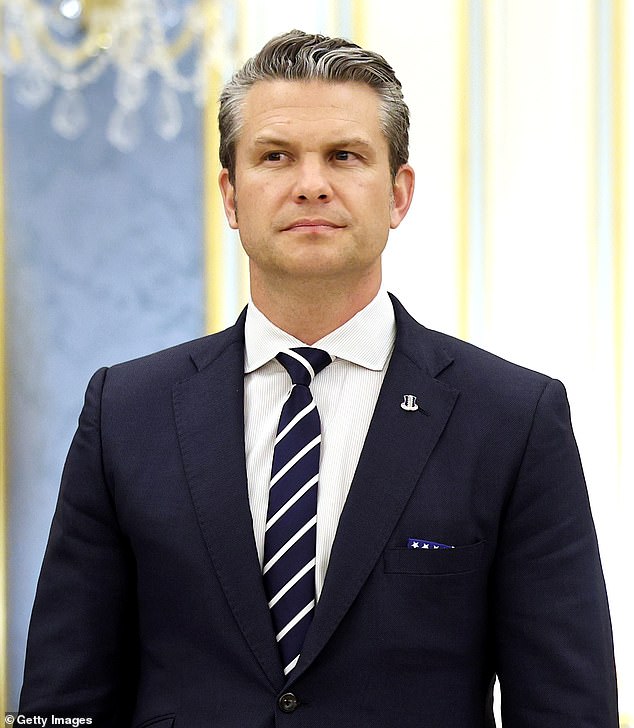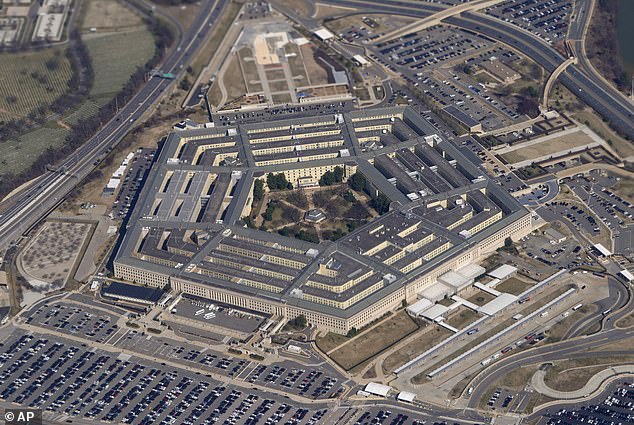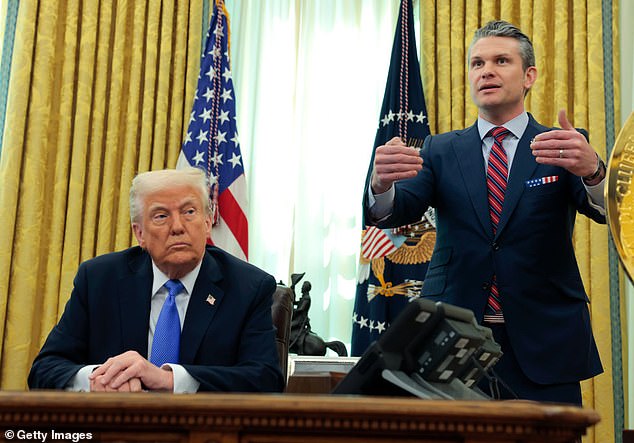Defense Secretary Pete Hegseth has imposed sweeping new restrictions on press access within the Pentagon.
Effective immediately, journalists must now obtain official approval and be escorted by government personnel throughout most areas of the Department of Defense headquarters in Arlington, Virginia.
Announced on Friday, the Defense Secretary’s newest directive includes press restrictions to locations that were previously accessible without oversight, such as the offices of top aides, service branch press rooms and the Joint Chiefs of Staff.
In addition, reporters are now required to sign confidentiality agreements and wear updated identification badges as part of enhanced security protocols.
‘While the Department remains committed to transparency, the Department is equally obligated to protect CSNI (classified national security information) and sensitive information – the unauthorized disclosure of which could put the lives of US Service members in danger,’ Hegseth said in a memorandum.
‘Failure by any member of the resident or visiting press to comply with these control measures will result in further restrictions and possibly revocation of press credentials,’ the memo continued.

Defense Secretary Pete Hegseth (pictured) has imposed sweeping new restrictions on press access within the Pentagon, which includes press restrictions to locations that were previously accessible without oversight

Effective immediately, journalists must now obtain official approval and be escorted by government personnel throughout most areas of the Department of Defense headquarters in Arlington, Virginia (pictured)
Hegseth’s decision comes in response to a series of information leaks during his tenure.
Two months ago, the Pentagon was humiliated by a leak to the New York Times indicating that billionaire Elon Musk was to be briefed on US military plans in the event of a conflict with China.
Though the briefing never occurred, due to an order from President Donald Trump, Hegseth later suspended two Pentagon officials as part of an internal investigation into the disclosure.
Another notable breach involved the editor-in-chief of The Atlantic, Jeffrey Goldberg, who was accidentally included in a Signal group chat where Hegseth discussed planned military strikes in Yemen.
Trump’s former national security adviser, Mike Waltz, took responsibility for the error and was reassigned to a different role.
The Pentagon Press Association has strongly criticized the Defense Secretary’s latest directive, calling it a direct assault on press freedom.
‘There is no way to sugarcoat it. Today’s memo by Secretary Hegseth appears to be a direct attack on the freedom of the press and America’s right to know what its military is doing,’ the association said in a statement Friday night.
‘The Pentagon Press Association is extremely concerned by the decision to restrict movement of accredited journalists within the Pentagon through non-secured, unclassified hallways.’
However, Hegseth’s crack down on press access isn’t the first of the Pentagon’s efforts to clamp down on leaks.
Following President Trump’s return to office in January, the administration has taken several aggressive actions toward the press, including FCC investigations into ABC, CBS and NBC News.

Following President Trump’s return to office in January, the Pentagon has intensified its efforts to clamp down on leaks. Pictured: President Donald Trump and US Secretary of Defense Pete Hegseth deliver remarks in the Oval Office of the White House
Additionally, restrictions imposed on The Associated Press’ access to certain White House events earlier this year led to a court battle that is ongoing.
Meanwhile, the White House has expanded access for conservative media outlets more favorable to the administration, according to the Associated Press.
Despite these restrictions, a recent study found that Trump has engaged with reporters more frequently in his first 100 days back in office than any of his six predecessors.
Nevertheless, Hegseth has maintained a notably low profile with the press. He has yet to speak to the press in the Pentagon briefing room and only one official Pentagon press briefing has taken place since January 20.
The Pentagon has also taken other steps to make it increasingly difficult for reporters as multiple major news outlets have lost office space within the Department of Defense headquarters.